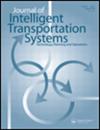Reliability-based journey time prediction via two-stream deep learning with multi-source data
IF 2.8
3区 工程技术
Q3 TRANSPORTATION
Journal of Intelligent Transportation Systems
Pub Date : 2025-03-04
DOI:10.1080/15472450.2023.2301707
引用次数: 0
Abstract
This paper presents a distribution-free reliability-based prediction approach for estimating journey time intervals with multi-source data using a two-stream deep learning framework. The prediction framework consists of a long short-term memory (LSTM) module for extracting temporal features and a convolutional neural network (CNN) module for extracting spatial-temporal features from the heterogeneous data. The precision and reliability of the prediction are assessed respectively by the Mean Prediction Interval Width (MPIW) and Prediction Interval Coverage Probability (PICP) metrics. For computational effectiveness, a Gaussian approximation is adopted to formulate a smooth and differentiable loss function for training the prediction framework. The computational experiments are conducted based on a real-world Hong Kong corridor, where multi-source data including traffic and weather conditions are collected. The proposed framework shows significant improvements over existing methods in terms of both precision and reliability over a range of traffic and weather conditions. This study contributes to the development of reliability-based intelligent transportation systems with advanced deep learning techniques.
通过多源数据的双流深度学习进行基于可靠性的行程时间预测
本文介绍了一种基于无分布可靠性的预测方法,该方法利用双流深度学习框架,通过多源数据估算行程时间间隔。预测...
本文章由计算机程序翻译,如有差异,请以英文原文为准。
求助全文
约1分钟内获得全文
求助全文
来源期刊
CiteScore
8.80
自引率
19.40%
发文量
51
审稿时长
15 months
期刊介绍:
The Journal of Intelligent Transportation Systems is devoted to scholarly research on the development, planning, management, operation and evaluation of intelligent transportation systems. Intelligent transportation systems are innovative solutions that address contemporary transportation problems. They are characterized by information, dynamic feedback and automation that allow people and goods to move efficiently. They encompass the full scope of information technologies used in transportation, including control, computation and communication, as well as the algorithms, databases, models and human interfaces. The emergence of these technologies as a new pathway for transportation is relatively new.
The Journal of Intelligent Transportation Systems is especially interested in research that leads to improved planning and operation of the transportation system through the application of new technologies. The journal is particularly interested in research that adds to the scientific understanding of the impacts that intelligent transportation systems can have on accessibility, congestion, pollution, safety, security, noise, and energy and resource consumption.
The journal is inter-disciplinary, and accepts work from fields of engineering, economics, planning, policy, business and management, as well as any other disciplines that contribute to the scientific understanding of intelligent transportation systems. The journal is also multi-modal, and accepts work on intelligent transportation for all forms of ground, air and water transportation. Example topics include the role of information systems in transportation, traffic flow and control, vehicle control, routing and scheduling, traveler response to dynamic information, planning for ITS innovations, evaluations of ITS field operational tests, ITS deployment experiences, automated highway systems, vehicle control systems, diffusion of ITS, and tools/software for analysis of ITS.

 求助内容:
求助内容: 应助结果提醒方式:
应助结果提醒方式:


